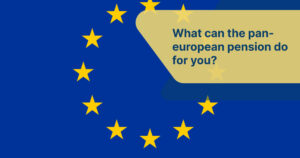
In March 2022 the pan-european pensions became available in Germany. The pan-european pension plan (PEPP) was born out of an initiative of the European Commission to further improve the labor mobility inside the European Union by creating a separate EU pension system for expats that often move around and often accumulate private pension schemes in different EU countries.
It aims to promote the further integration of the union by creating truly EU-wide capital pools, rather than nationalized pools, and is a crucial first step towards the European Capital Market Union.
Designed by consumer organizations, researchers and representatives of the industry, the pan-european pension (PEPP) is designed to provide an inexpensive and portable pension plan.
It purposefully creates a level playing field by allowing any asset management firm, insurance firm or investment fund manager to create a pan-european pension plan and makes it easy to market them in the European Union under a unified passport under EU regulatory supervision.
However, due to vastly different regulations between countries when it comes to pension plans ranging from tax-deductibles, bankruptcy laws (can your assets be claimed in personal bankruptcy) or collateral requirements (can you borrow against your reserves) the pan-european pension plan has to separate the assets into country-compartments.
E.g. If you are saving into the pension plan while living in Germany, then this is happening under German regulations and the money has to be kept in the German compartment.
Should you relocate to another country (e.g. Spain) then you start saving in the Spanish compartment. This also satisfies euro-skeptics, as the question of how funds should be treated when the country departs from the EU is easily settled.
So what are the upsidesof the pan-european pension?
The biggest upside is that the pan-european pension is designed for maximum flexibility, as the EU doesn’t have authority over taxation it designed the pan-european pension plan as a pension product without tax benefits and as a consequence it is possible to liquidate the assets at any time and to have very flexible payout options, as well as credit options against such a plan.
Typical pension plans are investment contracts that trade off flexibility for a tax refund on the contributions paid in. For example, in Germany, the rurup pension plans designed for high income and self-employed people can have tax refunds upto 40% of the contributions. Likewise, the returns (dividends or capital gains) in those contracts are not taxed, yielding significantly more upside than investing the same amount without tax benefits would have.
However, the German state is only willing to provide those if these investments are non-refundable and the funds can only be paid out after the age of 62.
Pan-european pension plans do not have this tax-constraint and are therefore much more flexible. The funds can be drawn down at any time, and you are able to move the funds between providers every 5 years OR when relocating to another country.
The next upside is that costs are capped at 1% AUM, which is comparable to what many private banks offer their wealthy clientele.
This limit on the costs is also the biggest difference compared to the typical German pension plans. German pension investment plans allow you to invest money in the present in order to finance a pension in old age and falls exclusively under German jurisdiction, and the costs are almost always higher than 1% allowed under the PEPP. A practice that investment managers can get away with as the cost difference is essentially paid for by the German state, taking into consideration that the tax-benefits negate the cost advantages offered by the PEPP.
Sadly, there are no tax benefits for the PEPP, but there have been some political discussions to allocate them. However, as of today, there is nothing tangible yet.
That’s also the reason why so far none of the existing asset managers have taken the initiative to create a PEPP investment plan in Germany. The last big benefit is that PEPP contracts are mandated to invest in ESG-compliant investment products, securing our (environmental) future. Horizon65 is actively working to launch a pan-european pension plan and if you are interested, you can register your interest.
For now, we can advise you on how to take advantage of the pension plans with tax-benefits available in your country. Feel free to apply for a free consultation with us.

